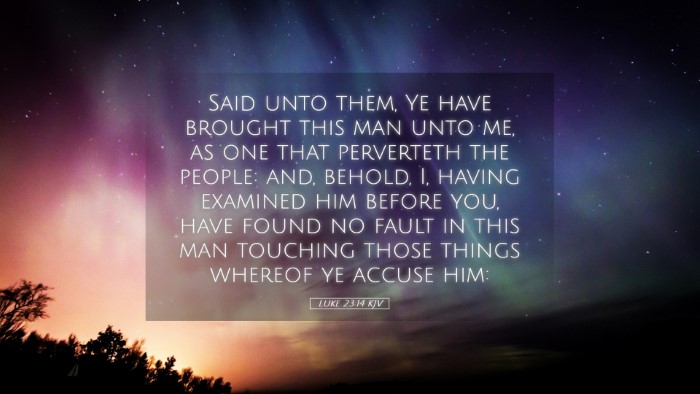Commentary on Luke 23:14
Luke 23:14 states:
"And said unto them, Ye have brought this man unto me, as one that perverteth the people: and, behold, I, having examined him before you, have found no fault in this man touching those things whereof ye accuse him."
This verse is a pivotal moment in the trial of Jesus, revealing the political and judicial maneuvering of the day. It invites deeper reflection from pastors, students, theologians, and Bible scholars regarding the nature of truth, justice, and the role of authority.
The Context of the Trial
In understanding this verse, it is essential to consider the broader context. The trial of Jesus unfolds against the backdrop of escalating tensions between the Jewish authorities and the Roman power. Jesus' arrest was driven by envy and a desire to eliminate a perceived threat to the established order.
Insights from Commentaries
1. Matthew Henry's Commentary
Matthew Henry observes that this statement by Pilate is decisively critical. He highlights several important aspects:
- The Examination of Jesus: Pilate, as the Roman governor, had the authority to determine Jesus' guilt or innocence. His declaration, having examined Jesus, suggests a thorough engagement with the accusations laid against him.
- The Accusation of 'Perverting the People': This phrase indicates the charges brought forth by the Jews. They insinuated that Jesus was leading the people astray from traditional Jewish teachings and inciting rebellion.
- Innocence Established: Henry emphasizes that Pilate’s conclusion is remarkably clear; he found no fault in Jesus. This assertion underscores the unjust nature of the subsequent crucifixion.
2. Albert Barnes' Notes on the Bible
Barnes provides further depth to the understanding of this verse:
- Political Pressure: Pilate’s statement reflects the political pressure he faced from the Jews. He recognized that the accusations were largely fabrications driven by fear of losing control over the populace.
- Public Perception: The public trial illustrates the tension between justice and public sentiment. Barnes notes that Pilate was more concerned with his standing in the eyes of the people than with true justice.
- Jesus as the Innocent Victim: The declaration of Jesus’ innocence serves as a profound commentary on the miscarriage of justice, where societal and political motives overshadow moral righteousness.
3. Adam Clarke's Commentary
Adam Clarke offers a theological perspective on this event:
- Divine Sovereignty: Clarke emphasizes that despite the apparent miscarriage of justice, God’s sovereignty is at work. The innocence of Jesus is not merely a political statement; it serves a divine purpose in the broader narrative of redemption.
- Fulfillment of Prophecy: The innocence of Jesus contrasts sharply with the prophecies in Isaiah regarding the suffering servant. Clarke notes the significance of fulfilling these prophecies despite the injustice of the trial.
- The Nature of Judgment: Clarke reflects on the nature of judgment and how human authorities can often fail to discern true justice. He posits that Pilate’s declaration reveals a deeper spiritual blindness at play.
Theological Implications
This verse offers several theological implications worthy of contemplation:
- Understanding Innocence: The declaration of Jesus' innocence invites believers to grasp the significance of His sacrificial death, shedding light on the nature of sin and atonement.
- The Role of Authority: Pilate's actions demonstrate the complexities of human authority and the potential for corruption when truth is subordinated to political expediency.
- Justice and Redemption: This moment in the trial of Jesus encapsulates the struggle between justice and redemption. It serves as a powerful reminder of how God uses flawed human systems to achieve His divine plans.
Conclusion
Luke 23:14 is a cornerstone verse in the narrative of Christ’s passion. The wisdom provided by Matthew Henry, Albert Barnes, and Adam Clarke sheds light on the profound truths embedded in this brief yet crucial statement. It encompasses themes of innocence, the quest for truth, and the overarching sovereignty of God in the narrative of redemption. As we reflect on these insights, we are encouraged to engage deeply with the text and its implications in our contemporary context.


